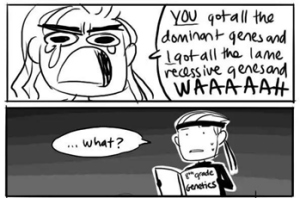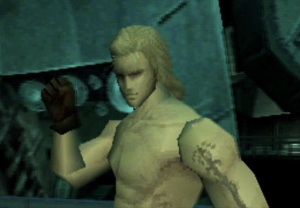Myth: Liquid Snake thinks dominant genes are superior

Fact: It’s an issue with how the Japanese language discussed genetics, along with Hideo Kojima mixing up his terms.
By Jen Miller, Posted on August 10, 2021
It’s been a running joke among Metal Gear fans that Liquid Snake’s diatribe against the genetic differences between his clone brother and himself in Metal Gear Solid makes no sense from a scientific perspective.
Things get even more complicated with the post-credits revelation from Revolver Ocelot:
Worse yet, in the original Japanese script, Ocelot actually referred to Solid Snake as “the recessive one”!
So it turned out, Liquid had the dominant genes, while Solid had the recessive genes… except that Liquid has blond hair, which is a recessive trait, while Solid Snake has brown hair, a dominant trait (no, he doesn’t fucking dye it).
While the game’s script makes it sound as though “recessive” is a synonym for “inferior” or “flawed,” and “dominant” is a synonym for “superior,” in reality “dominant” and “recessive” have nothing to do with genetic superiority or inferiority—a “recessive gene” is simply a gene that is usually masked by the presence of a “dominant gene.”
Given the context clues of the narrative, most fans have accepted that Liquid meant Solid Snake had the superior genes, while he was stuck with the inferior genes. This is supported by Metal Gear Solid 2: Sons of Liberty’s in-game book, In the Darkness of Shadow Moses:
 Perhaps Liquid’s genetic misunderstanding stems from spending too much time watching YouTube armchair geneticists?
Perhaps Liquid’s genetic misunderstanding stems from spending too much time watching YouTube armchair geneticists?However, some fans took the game’s script literally, trying to reconcile it with real-world biology. They claim that Liquid does have all of Big Boss’s recessive genes (hence the blond hair), but the genes for creating a better soldier were supposedly recessive all along. Another in-universe explanation is that Liquid simply doesn’t know what the hell he was talking about… though this makes little sense, given that Japanese Ocelot also refers to “the inferior one” as “the recessive one.”
The real reason is much simpler—Kojima messed up his terms. Though given the following context, his mistake is more understandable.
In Japanese, back when Metal Gear Solid was written, the kanji used to refer to dominant genes (優性) has connotations of “being better/superior/preferable.” Likewise, the kanji for recessive genes (劣性) has connotations of “being inferior.” This led to misunderstandings about what these terms actually meant.
This confusion became so prominent that, in 2017, the Genetics Society of Japan attempted to remove the connotations of superiority and inferiority from their terms for dominant and recessive genes, in order to avoid discrimination against those with recessive traits.
 Regardless of the exact wording, the point of Metal Gear Solid is that Solid Snake defies his genetic fate and defeats his genetically superior brother.
Regardless of the exact wording, the point of Metal Gear Solid is that Solid Snake defies his genetic fate and defeats his genetically superior brother.Although it’s understandable for a Japanese layman, or a translator, to get the meanings mixed up, Kojima was making a game about genes and their influence over our lives. Given the research he must have done (including reading up on Richard Dawkins’ The Selfish Gene), he should have known better.
Ultimately, though, the problem lies with so-called “Lore Experts” who obsess over words, rather than the meaning behind the words.
Special Thanks to Marc Laidlaw of JunkerHQ and Jonathan Ingram for helping out and confirming a few things.